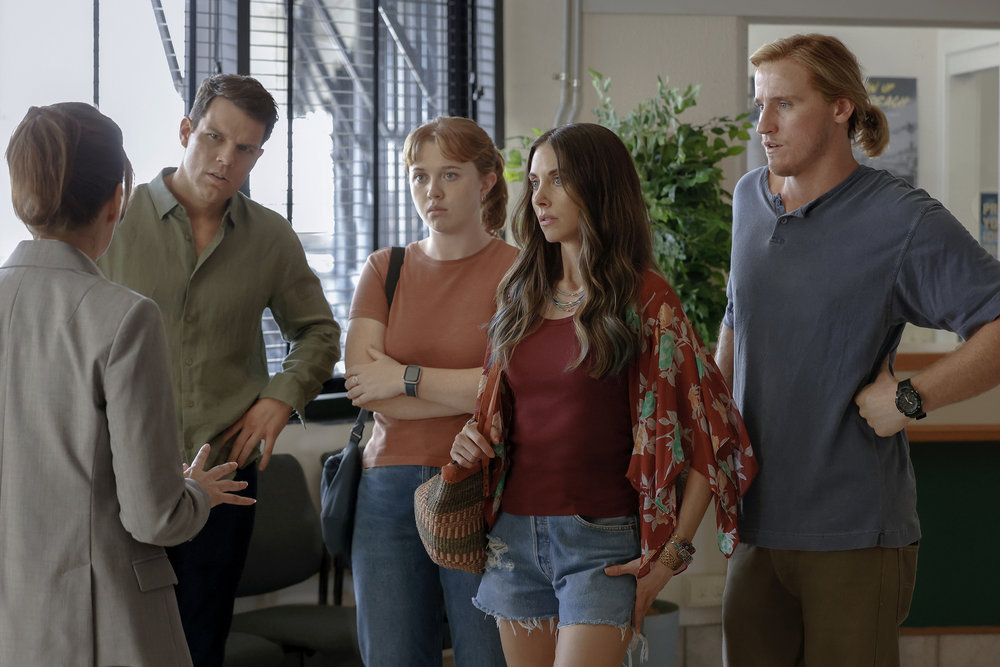The apple never falls far from the tree, according to the proverb that gives Peacock’s new domestic thriller its title. But if the tree is Big Little Lies—both shows are based on best-selling mystery novels by Liane Moriarty—then Apples Never Fall, which will stream in full beginning March 14, has rolled quite a distance downhill from whence it dropped. Even Hulu’s silly adaptation of Moriarty’s Nine Perfect Strangers is substantially better.
Considering the personnel involved, it’s hard to tell why the show went so frustratingly wrong. Moriarty is on board as an executive producer. Showrunner Melanie Marnich worked on a pair of fascinating Brit Marling and Zal Batmanglij series, A Murder at the End of the World and The OA, after writing the very best episode of Big Love. Annette Bening (also an executive producer) and Sam Neill star as Joy and Stan Delaney, married tennis coaches who’ve recently sold their academy and retired. The eldest of their four adult children are played by the reliably great Jake Lacy and Alison Brie.

Yet the acting is inconsistent (even Neill’s hotheaded performance can verge on John McEnroe camp), and the directing workmanlike. All of which might have been forgivable if the script, from premise to characters to the execution of big plot twists, wasn’t such a disaster. The show is goofy from the very beginning. In the overwrought opening scene, Joy rides her apple-green bicycle through her hometown of West Palm Beach. She frowns, passing the Garces (formerly Delaney) Tennis Academy, and picks out a perfect red apple at an outdoor market. Katie Herzig’s slow, moody “Buried” (sample lyric: “All the secrets buried in the backyard”) plays on the soundtrack. Then, after an Apples Never Fall title card, the camera follows a trail of apples scattered across asphalt, zooming in on the abandoned bike with blood staining its gears.
I couldn’t help it; I laughed. Obviously, Joy’s disappearance isn’t so funny to her children, who soon realize that the annoying mom who never stops calling and texting them has become impossible to reach. In the absence of a believable explanation from Stan, they start investigating. Some of the Delaneys, who each get their own point-of-view episode, are broad caricatures. Stan has exactly one mood: angry. Like a watered-down version of the actor’s smug White Lotus villain, Lacy’s Troy works in venture capital and wears T-shirts that remind everyone he went to Stanford. Amy (Brie) is a central-casting unmoored hippie. Their younger siblings have circumstances rather than personalities. Brooke (Essie Randles) has a female fiancée and a physical therapy practice; Logan (Conor Merrigan Turner), says Joy, likes “boats and yoga.” For declining to continue the Delaney tennis dynasty, all four kids are disappointments to Stan.

Of course, once the search for Joy begins in earnest, everyone’s predictable secrets (infidelity, mostly) come out. And two key suspects emerge. There’s Stan, who has a nasty scratch on his face, has told some suspicious lies about his wife’s whereabouts, and, as the show never lets us forget, has quite a temper. More mysterious is Savannah (Georgia Flood), a young woman who appeared at the Delaneys’ doorstep months ago with a bloody forehead and a story about an abusive husband. Bored in retirement and desperate to mother someone as her own children ignored her, Joy took Savannah into her home over her husband’s objections. She’s long gone by the time Joy vanishes, but Logan urges the police to look into her, whoever she is, anyway.
It’s a serviceable premise for a potboiler, despite the thin characters and trope-laden plot. But subpar storytelling robs Apples Never Fall of all suspense—or, really, any other form of enjoyment. The dialogue leans on cliché: “I was like a father to you!” “She was a force.” “It’s crazy, isn’t it? How a split second can change everything for the rest of your life.” And Marnich treats viewers like we’re stupid, spoon-feeding unadorned exposition and analysis through a pair of generic detectives (Jeanine Serralles and Dylan Thuraisingham). “Did Stanley Delaney do what I think he just did?” one asks, in a typical exchange. “Yes, he did. He just threw his son under the bus,” the other replies. Often, characters’ motivations seem nonsensical. Other times, the show hints so relentlessly at why people do the things they do that you can see the twists coming several episodes away. I can’t imagine I’ll be the only one to guess the ending early on.
About that ending. It arrives with the same thuddingly obvious force as the hurricane that also hits West Palm late in the season. And it compounds the disservice that the show does to its mostly talented cast and viewers hungry for another delicious Liane Moriarty binge. Instead of saying something specific and true about women’s lives and families, the way Big Little Lies did, Apples Never Fall reduces Joy to the blandest, most unsurprising maternal stereotype. In a finale plainly engineered to make us weep, I felt nothing except irritation. Maybe it would’ve been different if Joy, or any other character, had come off as a real person in the first place.
More Must-Reads from TIME
- Caitlin Clark Is TIME's 2024 Athlete of the Year
- Where Trump 2.0 Will Differ From 1.0
- Is Intermittent Fasting Good or Bad for You?
- The 100 Must-Read Books of 2024
- Column: If Optimism Feels Ridiculous Now, Try Hope
- The Future of Climate Action Is Trade Policy
- FX’s Say Nothing Is the Must-Watch Political Thriller of 2024
- Merle Bombardieri Is Helping People Make the Baby Decision
Contact us at letters@time.com